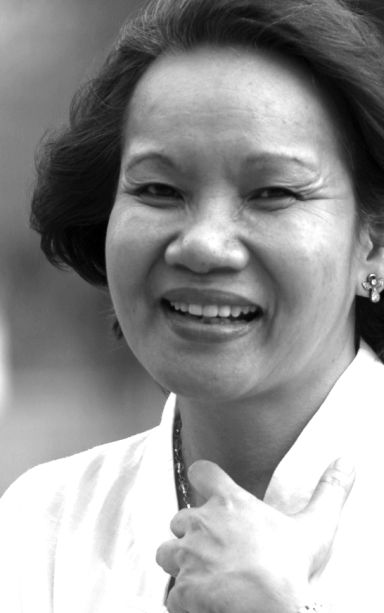
LOGARTA
Towards the beginning of the seventies, groups among the youth had awakened into intensified nationalism. In the positive sense, they were envisioning a future of authentic independence and a government that was actually serving the Filipino people.
Anti-imperialist fora invited students to reflect on the influence of the United States in the government and its foreign policy.
Students joined demonstrations, rallies, marches to express their active protest to irrelevant education and anomalous realities. More than these, they organized, showing that this was not a passing interest but what would become a sustained effort.
A nun chose to live among the poor in Carbon Market. Students with their teachers began to realize that there was much for them to learn from a trip to the countryside. Attending a protest rally became recognized as an alternative learning experience. A young professional who went to work with makeup and genuine jewelry put the jewelry away and went to work bare-faced. Many educators especially those in sociology, political science, anthropology, history, and Christian living, and others realized that teaching had become more meaningful because of the movements.
Evelyn and her batchmates joined a seminar of Christian nationalists. Here they shared a better understanding of the realities in our country. Most of these young girls continue to love their country in the most creative ways. Here the seminarians had an encounter with the farmers and their organizer, Boy Ipong. One of the farmers oriented the group on genuine leadership: Christlike. Evelyn really took the learnings from the orientation to heart.
She worked actively to spread the enlightened analysis of the national situation. Once, she asked me to take her place in a session that was meant to discuss the Muslim problem. So I said: “What? Do I have to do this on a Sunday?” She replied: “Is this not a very good thing to do on a Sunday?” She moved into the deep and actually went to the countryside to orient and organize farmers.
Boy and Boloy were the young men who actually “radicalized” me. Boloy was frail, smaller than most, very serene. When he discussed social issues even radical solutions, he did not raise his voice or talk with anger. He was very rational but not coldly so. Boy, also small, lived what he lectured on.
Pope Francis would have really liked him because most of his work was actually in the peripheries — mostly with farmers. What I found amazing was that with all his work he found time to visit my mother, a terminal cancer patient in the seventh floor of the Makati Medical Center.
But while several sectors of society welcomed the raised consciousness of the youth, farmers, workers, professionals and others, the administration of Ferdinand E. Marcos considered these a threat. It had implemented means to perpetuate his power. Now it was confronted with an obstacle.
So the danger to stability was exaggerated and martial law was declared. Such a perspective can be seen in the act of rounding up, arresting all those opposing him or suspected of being against them. Other sources of criticism such newspapers and radio stations were all shot down.
Headquarters or simple meeting places of youth and student groups were raided. This was how I lost the portable typewriter I had lent to the students. Common people have a wisdom of their own. Staff of a neighboring establishment actually called me up and advised me to avoid going there, protecting me from being “picked up.”
The arrests, detention and raids generated a great deal of anxiety among the progressive forces. Some reached the decision of living among the people in the countryside. But the work to bring about changes in the society continued. The oppressive conditions stimulated new forms of clarifying the realities: periodikit (daring to post slogans on the walls during curfew time), underground publications, nationalist paintings, nationalist songs and many others.
One day after the afternoon Mass at the Redemptorist Church, the people went in a procession towards Fuente Osmeña Circle. In Fuente, there were fire trucks and people were sprayed with water. My sister tried to document the happenings. Someone wanted to grab the camera from her.
The late Bishop Leo Tumulak was providentially there for her to pass on the camera. But at the corner near Robinson’s two men with guns stopped Fr. Rudy Romano and Fr. Abdon Josol. They wanted to take them to a jail in Ramos, but the people went along with them. We need to be together to keep our freedom.
Disclaimer: The comments uploaded on this site do not necessarily represent or reflect the views of management and owner of Cebudailynews. We reserve the right to exclude comments that we deem to be inconsistent with our editorial standards.




